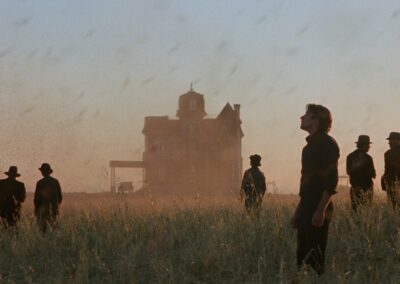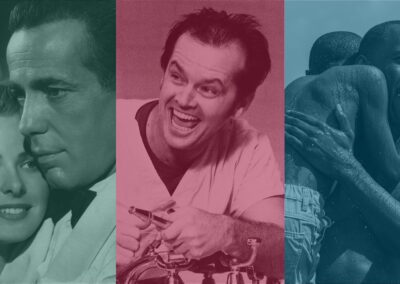My students are often surprised to hear me say that there are a number of films I have seen well over 10 times at the cinema, in a lifetime devoted to the medium. And that’s not taking into account the numbers of viewings in a classroom, on video or DVD or on television.
In a world obsessed my “newness” and “the latest,” it probably does sound a bit odd that, in many ways, I would prefer to watch something at the cinema I have already seen before, many times, than opt for a more recent release. The reasons are obvious, however. Firstly, you are unlikely to be disappointed. You know what’s coming, yes, that makes you enjoy the journey even more. You’re not there for the denouement; the narrative. You’re there for the little details; the stuff at the edge of the frame; the subtle contributions of the cameraperson; editor; costume designer; composer; character actor. All the things you didn’t quite notice the first, second, sixth, ninth time round.
Secondly, if cinema is an art form, and, in my mind, it is one of the greatest, then surely, the more one returns to a work of art at different points in their own journey through life then the more great works may reveal. Art survives time’s test and, like the ocean, is always the same but always different.
The third reason to revisit a great movie on the big screen is, of course, to share the experience with someone new. Like listening to a great record together and realising that you may well be forging a new bond, going to see a much-loved movie with a friend, family member, new partner or (in my case) your pupils can really add another layer of meaning to something with which you are already very familiar.
A new, re-mastered print of one of my favourite films, Terrence Malick’s Days of Heaven from 1978, is playing at the UPP in April and, once more, I will be bathing in its wonder for over the 10th time at a cinema. I hope that many readers will join me.
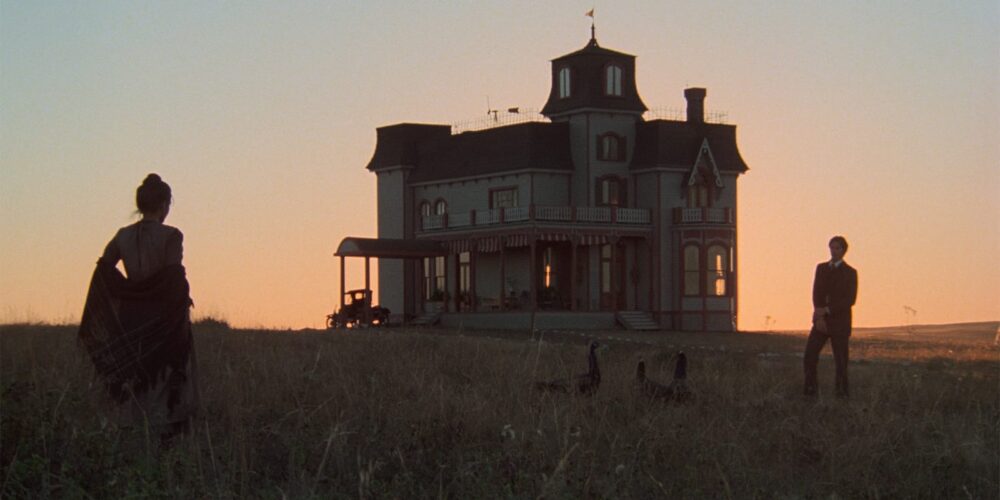
Produced by BBS (the company that, in 1969, had fostered Easy Rider upon an unsuspecting world; a hard act to follow but they managed – Five Easy Pieces, The Last Picture Show and Academy Award winning Vietnam documentary Hearts and Minds are all BBS productions) 1978’s Days of Heaven tells the story of a doomed ménage a trois in a Hardy-esque tale, set against the backdrop of the Great Depression and America’s vast farmlands in the so called Texas Panhandle (though much of the film was actually shot in Canada).
I first encountered the film on a “Hollywood in the 70s” course as part of my Film and Literature degree, taught by Victor Perkins, at the University of Warwick, back in the early 1980s. It was my first viewing and once seen, I was forever smitten.
I had seen Malick’s debut Badlands, of course, both on TV and as part of a memorable double bill with Taxi Driver at the ABC in Chatham one Sunday afternoon in my mid-teens and had been blown away. However, whilst I knew about Heaven, I hadn’t seen it (these were the days before video – so, unless the film had opened wide or you managed to see it at an independent cinema like London’s Scala – it was almost impossible to catch up with films after their first run, until they turned up on TV some 7 or so years later).
Regular readers of this blog might know that when Badlands was shown here at the UPP a couple of years ago at an “anti-Valentine’s Day” screening, I noted:
At the time, it wasn’t especially well received (the acclaimed New Yorker film critic Pauline Kael called it “so preconceived, there’s nothing left to respond to,”) and its cold, distanced, extremely detached attitude towards what is presented on screen is likely to be divisive. It’s certainly not a movie which tells you what to think all the time. Although it’s certainly a film which will make you think (there are so many ellipses – you have to!).
It took Malick over four years to make his follow up (fans had to wait a further twenty years before he returned with the brilliant War drama The Thin Red Line in 1999). Much of what I wrote about Badlands, however, is true of Days of Heaven. It too is elliptical and distanced. It too is detached and requires that the spectator does some work.
But, there’s more. Days of Heaven is, quite simply, one of the most beautifully shot films of all time. Spanish cinematographer Nestor Almendros, who had worked on a number of French New Wave movies (including Truffaut’s The Wild Child; Rohmer’s Claire’s Knee and several movies with Barbet Schroeder) had already made one film in America (Monte Hellman’s little seen Two Lane Blacktop follow up Cockfighter in 1974) but this was his first major production. Almendros’ cinematography won the film its only Academy Award.
To be fair, one should also note that the film took so long to edit (two years) that when it came to “reshoots,” Malick also worked with the legendary Haskell Wexler (In the Heat of the Night, The Conversation, One Flew Over the Cuckoo’s Nest, Coming Home) so, whilst Almendros took home the Oscar, it is not fair to credit him totally with the overall “look” of the final film.
However, it was Almendros who shot most of the “magic hour” footage (the time after sunset but before night falls) utilising this soft natural light as far as possible to cast an ethereal glow on both the actors and, just as importantly, the landscape. For Days of Heaven is as much about the land and nature as it is about love and jealousy.
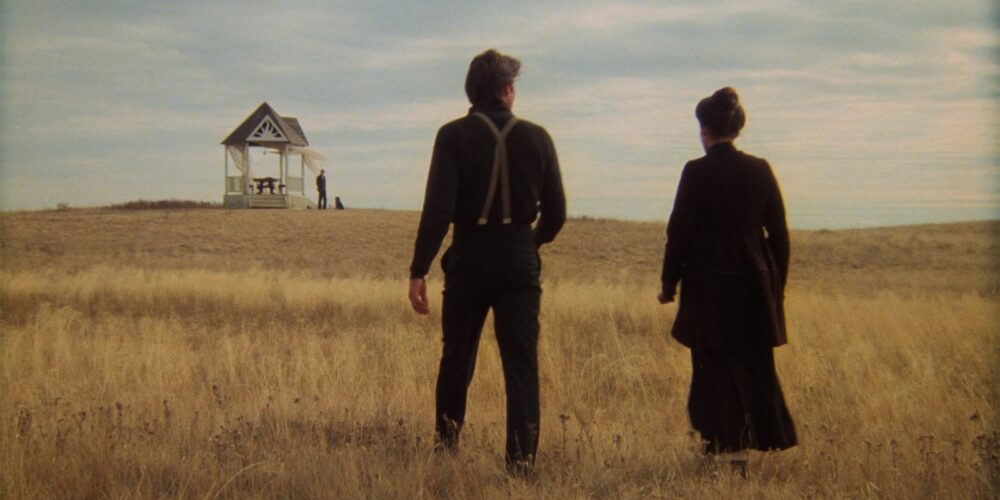
As already mentioned, the making of the film was a lengthy (and costly) process. Malick, the “perfectionist,” was apparently quite hard to work with and was unsure how the film would finally come together – so he experimented, shooting lots of extra footage, encouraging his actors to improvise and wasting large amounts of money and time.
The cast were well chosen, photogenic newcomers: the “impossibly young and handsome” Richard Gere (his real breakthrough – Paul Schrader’s American Gigolo would be released two years later); Brooke Adams (who would go on to appear in Phil Kaufman’s remake of Invasion of the Body Snatchers and David Cronenberg’s Stephen King adaptation The Dead Zone) and playwright Sam Shepard (who would be Oscar nominated for his turn as Chuck Yaeger in Phil Kaufman’s Tom Wolfe adaptation The Right Stuff in 1983). However, it was the casting of the 15 year old child actress Linda Manz, as Gere’s younger sister Linda, which was to prove to be the film’s trump card.
Manz, who also went on to appear, memorably, in Phil Kaufman’s Warriors “rip-off” The Wanderers in 1979 and, controversially Dennis Hopper’s 1980 “come back,” the harrowing Out of the Blue, was encouraged to make up her own lines, which eventually developed into the film’s narration. Just as Sissy Spacek’s voice over had done in Badlands, Manz’s take on what is going on in the film ties it together, but also makes us view what is unfolding at arm’s length – refracted through one of its participant’s “unreliable” narrators. Her viewpoint is naive, poetic, opaque and childishly wise.
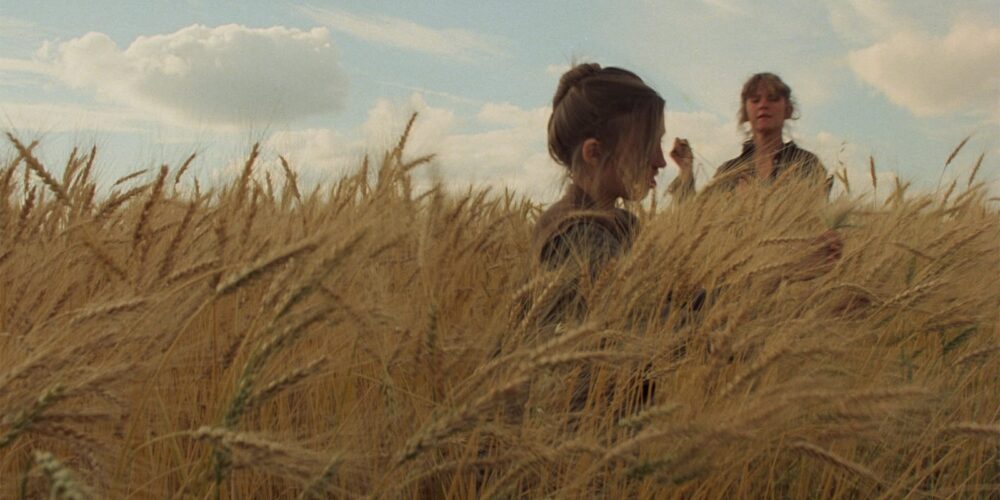
Once the movie had (literally) found its “voice,” Malick was able to edit the footage to fit the fragmentary nature of the way it is told and came up with something that “worked” on a gut level: full of great tenderness; wonderment yet always touched with tragedy.
But movies are more than just images and dialogue and the other collaborator whose work plays a vital part in making the film such a ravishing experience, is that of genius composer Ennio Morricone. It would be impossible to list here the many films enriched by a Morricone soundtrack (he scored over 400 films and TV shows) but it’s worth noting that, following his peerless work with Sergio Leone on the Dollars trilogy and, especially Once Upon a Time in the West, in the 1970s Morricone was still a relative outsider in American cinema (scoring only Two Mules for Sister Sara for Don Siegel in 1970; Bluebeard and The Human Factor for veteran Edward Dmtryk in 1972 and 1975 respectively and John Boorman’s disastrous sequel Exorcist II: The Heretic and Michael Anderson’s Jaws wannabe Orca: Killer Whale in 1977). I think that Heaven is one of his most memorable scores – clearly paving the way for some of the amazing work he went on to compose in the 1980s (Carpenter’s The Thing in 1982, Leone’s Once Upon a Time in America in 1984, Joffe’s The Mission in 1986 and De Palma’s The Untouchables in 1987, amongst others).
I am privileged to be “introducing” the film to audiences on its 14.45 screening on Sunday 21 April, so I don’t want to say much more.
Suffice to say, I know in advance that, once again, the opening montage of still black and white photographs from the period will have me “at hello;” Brooke Adams, Gere and Shepherd’s beauty will have me swooning; that shot of the glass (and its later parallel – Gere’s face underwater) will continue to perplex and haunt; the Locusts will still descend like something out of The Bible; I will lose myself in the film’s poetry and elliptical storytelling and, finally, I will stumble back into the light: older, wiser and touched deep within by Days of Heaven: that magic hour (and a half) of cinema at its most transcendent.
Dr Andrew C Webber is a Film teacher and examiner with over 37 years’ experience. He currently contributes to both the Cinema of the 70s and 80s magazines (available on Amazon); cassette gazette fanzine (available from cassette pirate on e-bay) and the Low Noise music podcast available on Spotify and Apple podcasts.
